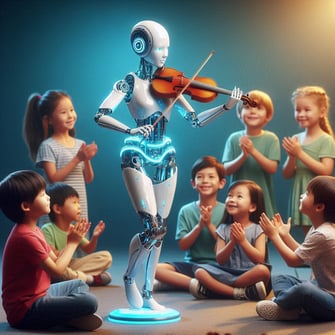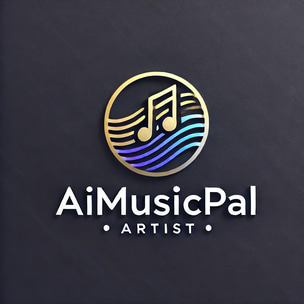What is AI Music? A Beginner’s Guide to the Future of Sound
Explore the world of AI Music with this beginner-friendly guide! Discover how artificial intelligence creates music, its impact on musicians and the industry, and what the future holds for AI in music. Whether you're curious about tech's role in music or what AI means for creativity, this blog breaks down the essentials in an easy-to-understand way.
9/4/20244 min read


Imagine pressing a button and having a song composed just for you—a tune that matches your mood, your favorite genres, or even the weather outside. Sounds futuristic? Well, this future is already here, and it’s called AI Music.
So, what exactly is AI Music? At its core, it's music created or influenced by artificial intelligence, the technology that allows computers to learn from data and make their own “decisions.” But AI Music isn’t just about robots jamming out; it’s about using advanced tech to enhance, inspire, and sometimes even transform the way we make and experience music.
Let’s dive into how this works, why it’s happening now, and what it means for musicians, listeners, and the music industry as a whole.
A Quick Intro to AI Music
AI in music goes back a little further than you might think. In the 1950s, some early computers were already creating simple melodies based on mathematical rules. Since then, AI has come a long way, evolving from these simple tunes to complex compositions that can mimic various genres and even specific artists. Nowadays, with the rise of machine learning (ML) and deep learning, AI has taken a central role in producing everything from background music for videos to full orchestral pieces.
But it’s not just about composition. AI is woven into many parts of the music industry—enhancing production, improving audio quality, and even providing personalized music recommendations on platforms like Spotify and YouTube. So, if you think you haven’t heard AI-generated music yet, think again!
How Does AI Create Music?
At the heart of AI Music is a model—a kind of “musical brain” trained on thousands, sometimes millions, of audio samples or pieces of music. The AI learns the patterns, rhythm, and structure, and uses these insights to produce new compositions that fit a given style or genre. Here’s a simplified breakdown of how it works:
Learning the Rules: The AI studies countless pieces of music, recognizing patterns like chord progressions, beats, and structures common to specific genres or styles.
Generating Music: With this knowledge, the AI can generate new music that aligns with these learned patterns but is still unique. Sometimes the result sounds eerily like a famous artist or composer—it can even match the vibe of a particular era or genre.
Several algorithms can be used to make this happen, like neural networks, which are models inspired by the human brain. One technique often used is called GANs (Generative Adversarial Networks), where two parts of the AI challenge each other—one creates music, and the other tries to tell if it’s “real” or AI-made. Over time, this process helps the AI produce music that feels surprisingly authentic.
The Impact of AI Music on Musicians and the Industry
AI Music brings both excitement and anxiety to the table. For artists, it’s a double-edged sword. On the one hand, AI tools are incredible for inspiration, composition, and production. Musicians can create drafts, get melody ideas, and even complete arrangements without waiting for inspiration to strike. AI-assisted platforms like Amper Music or AIVA allow musicians to experiment with new sounds and create tracks that might have taken hours or days to do manually.
For music producers and studios, AI is also a game-changer. It speeds up production, helps mix tracks more efficiently, and even removes unwanted noise from recordings. Imagine being able to instantly improve a recording with just a few clicks! However, AI also raises questions about creativity and originality. Some people worry that as AI tools get better at creating music, they might begin to overshadow human musicians. Will we still value music made by people if machines can create hits with similar emotional appeal?
And then there’s the big issue of copyright. If an AI creates a song that sounds just like a famous artist’s work, who “owns” that music? Who gets credit, and how do we even define “original” music in a world where AI is generating sounds based on countless human-made tracks?
The Future of AI in Music
So where is all this going? Some predict that AI will simply become another tool for musicians, like electric guitars or synthesizers, evolving music without replacing the creativity of human artists. AI-generated music could lead to entirely new genres, blending styles in ways humans haven’t considered. Others imagine AI as the foundation for adaptive soundtracks—music that changes based on what you’re feeling, the time of day, or even what’s happening in a movie or game.
Looking ahead, AI music will likely integrate with other technologies like virtual and augmented reality. Imagine stepping into a VR world and hearing a unique soundtrack created just for that moment, adapting to your actions and surroundings. Or picture a concert where a virtual artist performs songs that feel as real as any live show.
While there’s still a lot to work out—like making AI music sound more “human” and addressing legal and ethical concerns—one thing is certain: AI is here to stay, and it’s reshaping the musical landscape.
Wrapping It Up
AI Music is fascinating because it’s both familiar and new. It builds on centuries of musical tradition while introducing a future where anyone, even without musical training, could potentially create complex compositions. But it also raises big questions about art, creativity, and what it means to be human in a world where machines can create songs just like us.
Whether you’re a musician, a casual listener, or someone who just loves to explore the latest tech, AI Music is worth keeping an ear on. Who knows? The next time you hit “play,” the song you’re listening to might just have been created by a machine. Definitely on this website!
